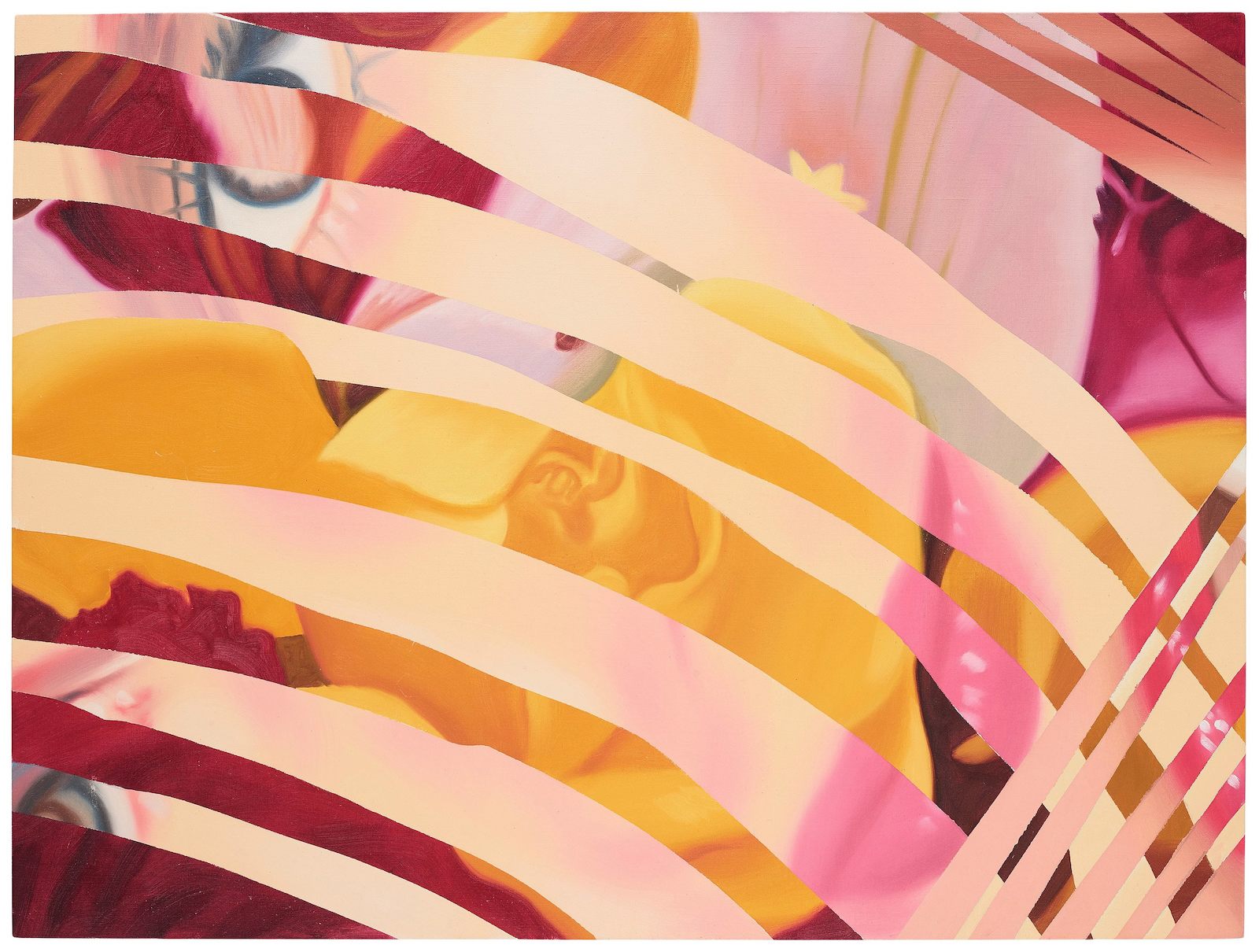James Rosenquist Gun-Play-Guns 1996 oil on canvas, laid on board 48 x 47 7/8 in. (121.9 x 121.6 cm.) Signed, titled and dated "Gun-Play-Guns, James Rosenquist 1996" along the overlap.
Provenance Galerie Thaddaeus Ropac, Paris Christie's, New York, Contemporary Art Day Sale, May 17, 2001, lot 190 Acquired at the above sale by the present owner Exhibited Galerie Thaddaeus Ropac, Paris, James Rosenquist Target Practice, May 14 – June 15, 1996 Literature James Rosenquist Target Practice, exh. cat., Galerie Thaddaeus Ropac, Paris, 1996, n.p. Catalogue Essay "I’ve been exhilarated by a numbness I get when I’m forced to see something close that I don’t want to see.” James Rosenquist 1972 James Rosenquist established himself as one of the leading artists of the American Pop art movement in the 1960s. The cool photorealistic aesthetic that he had become accustomed to in producing large-scale advertisements applied itself particularly well to the impersonal and fetishistic style that he and peers like Andy Warhol and Roy Lichtenstein would come to promote. Known for blending and distorting colorful American Pop imagery, Rosenquist is a thriving product of the sixties Pop art scene. Typically depicting bland or otherwise generic everyday objects, he renders them on large canvases in order to evoke a sort of immersive cinematic experience. Working from source materials, including photographs cut out from magazines, he often plays with scale to yield unexpected juxtapositions and almost surrealist narratives. The present lot, Gun-Play-Guns, isolates sleek fire arms upon a splashy, monochromatic tangerine background. The three guns seem to be held by one invisible culprit, each pointing in different directions, offering no escape to their unknown target. Their fluorescent treatment of the background both weakens the original purpose of these objects of violence and accentuates their lethality. When Gun-Play-Guns made its premiere at Thaddeus Ropac Gallery in 1996, the gallery was crowded with colorful gun paintings, playing up the allure of danger and flirting with the taboo of excitable violence. Upon immediately recognizing the work, the viewer is struck by the fluorescence of the orange which is simultaneously used both as a warning to keep away and as a means by which to grab one’s attention and entice closer. The viewer is caught completely unaware finding these three barrels pointed outwards, menacingly into the “real” world. The matter-of-factness of their representation, offered without context or emotion is paradoxically what makes the work arresting. This is not specific violence, or violence with any sort of purpose. No this is violence for its own enjoyment, to luxuriate in the high keyed tonality of the canvas and its reflected and infected aggression. Rosenquist’s ability to conjure quintessentially, albeit critically, American pictures has not dulled in the slightest over his extensive and accomplished career. Gun-Play-Guns is a superb example of just how far he has been able to take his practice and how much infinitely more may be left to follow. Read More
James Rosenquist Gun-Play-Guns 1996 oil on canvas, laid on board 48 x 47 7/8 in. (121.9 x 121.6 cm.) Signed, titled and dated "Gun-Play-Guns, James Rosenquist 1996" along the overlap.
Provenance Galerie Thaddaeus Ropac, Paris Christie's, New York, Contemporary Art Day Sale, May 17, 2001, lot 190 Acquired at the above sale by the present owner Exhibited Galerie Thaddaeus Ropac, Paris, James Rosenquist Target Practice, May 14 – June 15, 1996 Literature James Rosenquist Target Practice, exh. cat., Galerie Thaddaeus Ropac, Paris, 1996, n.p. Catalogue Essay "I’ve been exhilarated by a numbness I get when I’m forced to see something close that I don’t want to see.” James Rosenquist 1972 James Rosenquist established himself as one of the leading artists of the American Pop art movement in the 1960s. The cool photorealistic aesthetic that he had become accustomed to in producing large-scale advertisements applied itself particularly well to the impersonal and fetishistic style that he and peers like Andy Warhol and Roy Lichtenstein would come to promote. Known for blending and distorting colorful American Pop imagery, Rosenquist is a thriving product of the sixties Pop art scene. Typically depicting bland or otherwise generic everyday objects, he renders them on large canvases in order to evoke a sort of immersive cinematic experience. Working from source materials, including photographs cut out from magazines, he often plays with scale to yield unexpected juxtapositions and almost surrealist narratives. The present lot, Gun-Play-Guns, isolates sleek fire arms upon a splashy, monochromatic tangerine background. The three guns seem to be held by one invisible culprit, each pointing in different directions, offering no escape to their unknown target. Their fluorescent treatment of the background both weakens the original purpose of these objects of violence and accentuates their lethality. When Gun-Play-Guns made its premiere at Thaddeus Ropac Gallery in 1996, the gallery was crowded with colorful gun paintings, playing up the allure of danger and flirting with the taboo of excitable violence. Upon immediately recognizing the work, the viewer is struck by the fluorescence of the orange which is simultaneously used both as a warning to keep away and as a means by which to grab one’s attention and entice closer. The viewer is caught completely unaware finding these three barrels pointed outwards, menacingly into the “real” world. The matter-of-factness of their representation, offered without context or emotion is paradoxically what makes the work arresting. This is not specific violence, or violence with any sort of purpose. No this is violence for its own enjoyment, to luxuriate in the high keyed tonality of the canvas and its reflected and infected aggression. Rosenquist’s ability to conjure quintessentially, albeit critically, American pictures has not dulled in the slightest over his extensive and accomplished career. Gun-Play-Guns is a superb example of just how far he has been able to take his practice and how much infinitely more may be left to follow. Read More



.jpg)

.jpg)



.jpg)



Try LotSearch and its premium features for 7 days - without any costs!
Be notified automatically about new items in upcoming auctions.
Create an alert